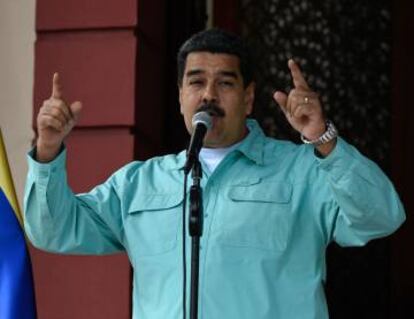Spain and Venezuela agree to rebuild ties after months-long diplomatic spat
Spanish government suspects Nicolás Maduro wants to restore relations to improve country’s international standing as it heads into elections


The governments of Spanish Prime Minister Mariano Rajoy and Venezuelan President Nicolás Maduro agreed on Wednesday to restore relations and return their respective ambassadors to their posts. The move puts an end to the bilateral diplomatic crisis that began in January when Maduro’s government declared the Spanish ambassador in Venezuela, Jesús Silva Fernández, persona non grata and Spain responded by expelling his Venezuelan counterpart Mario Isea.
The initiative came from Venezuela, which last week sent a letter calling for a political truce and the normalization of relations
The initiative came from Venezuela, which last week sent a letter to the Spanish Minister of Foreign Affairs Alfonso Dastis calling for a political truce and the normalization of relations.
After receiving the letter, Dastis spoke with the Venezuelan Minister of Foreign Affairs Jorge Arreaza in Madrid to begin negotiating a pact “in the framework of mutual respect and international law” that would protect each country’s right to express dissent. Dastis underlined that the restoration of relations will not stop Spain from calling out political repression and human-rights abuses in Venezuela.

The text outlines that Spain’s and Venezuela’s foreign ministries “have agreed to begin a process to normalize their diplomatic relations to the benefit of their citizens, who are united by close ties that must be preserved” and will return their ambassadors.
President Maduro celebrated the accord via a Facebook video shared on Wednesday: “Hopefully relations will improve, that’s how it should be,” he says.
According to a press release from the Venezuelan Ministry of Foreign Affairs, Maduro’s government expelled the Spanish ambassador Fernández on January 25 to protest the “continued aggression and ongoing interventionist acts in the internal affairs” of the South American country. But there was suspicion the decision was actually in retaliation for Spain’s support for sanctions against Venezuela that were approved by the European Union.
Hopefully relations will improve, that’s how it should be
President Maduro
The Spanish government said the agreement does not change its position on the EU sanctions but is rather a measure to ensure open lines of communication, given that more than 200,000 Spaniards are registered in Venezuela.
The move to improve relations comes as Venezuela becomes increasingly isolated by the international community. The Spanish government is interpreting this recent initiative as an attempt by Maduro to give the appearance that the government is opening up as it heads into critical presidential elections on May 20. The election, called unilaterally without the support of the Venezuelan opposition, has been heavily criticized by Spanish Prime Minister Rajoy, who questioned its legitimacy on his recent official trip to Argentina.
English version by Melissa Kitson.
Tu suscripción se está usando en otro dispositivo
¿Quieres añadir otro usuario a tu suscripción?
Si continúas leyendo en este dispositivo, no se podrá leer en el otro.
FlechaTu suscripción se está usando en otro dispositivo y solo puedes acceder a EL PAÍS desde un dispositivo a la vez.
Si quieres compartir tu cuenta, cambia tu suscripción a la modalidad Premium, así podrás añadir otro usuario. Cada uno accederá con su propia cuenta de email, lo que os permitirá personalizar vuestra experiencia en EL PAÍS.
¿Tienes una suscripción de empresa? Accede aquí para contratar más cuentas.
En el caso de no saber quién está usando tu cuenta, te recomendamos cambiar tu contraseña aquí.
Si decides continuar compartiendo tu cuenta, este mensaje se mostrará en tu dispositivo y en el de la otra persona que está usando tu cuenta de forma indefinida, afectando a tu experiencia de lectura. Puedes consultar aquí los términos y condiciones de la suscripción digital.








































